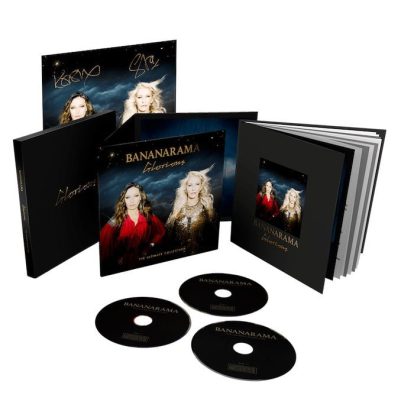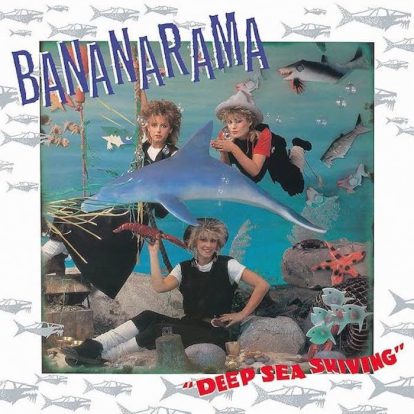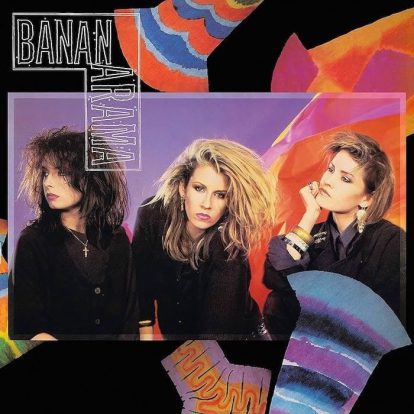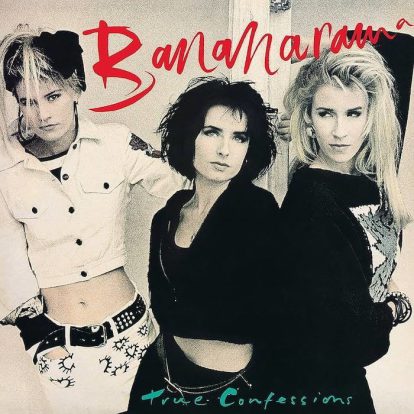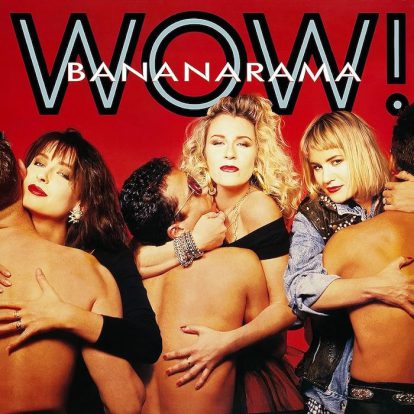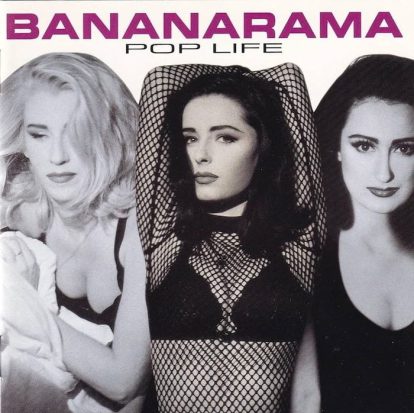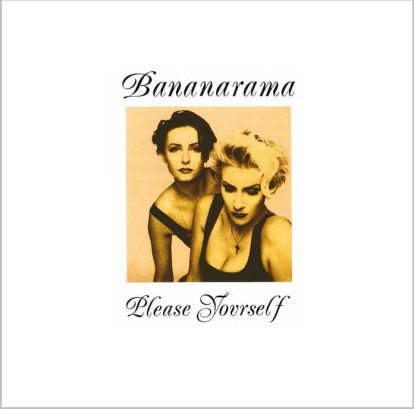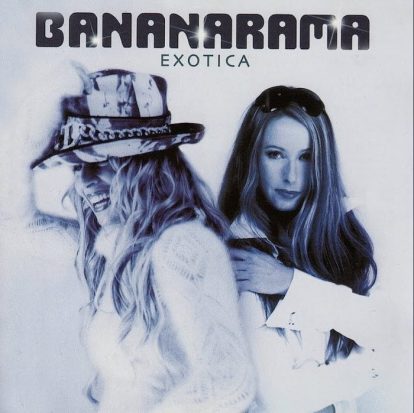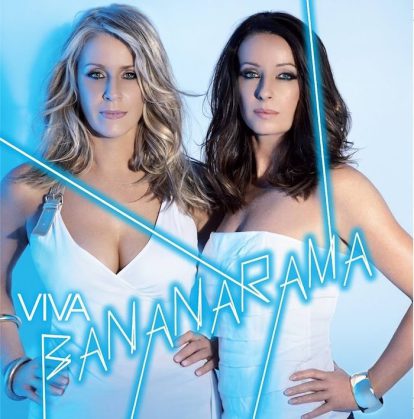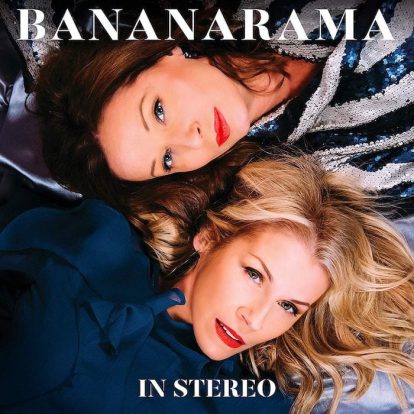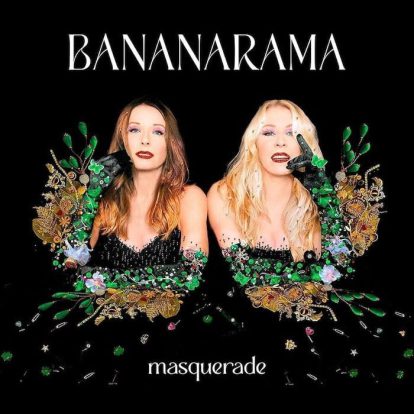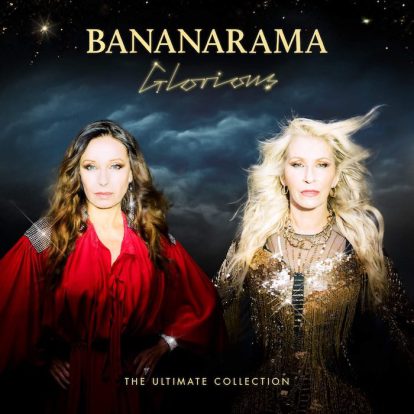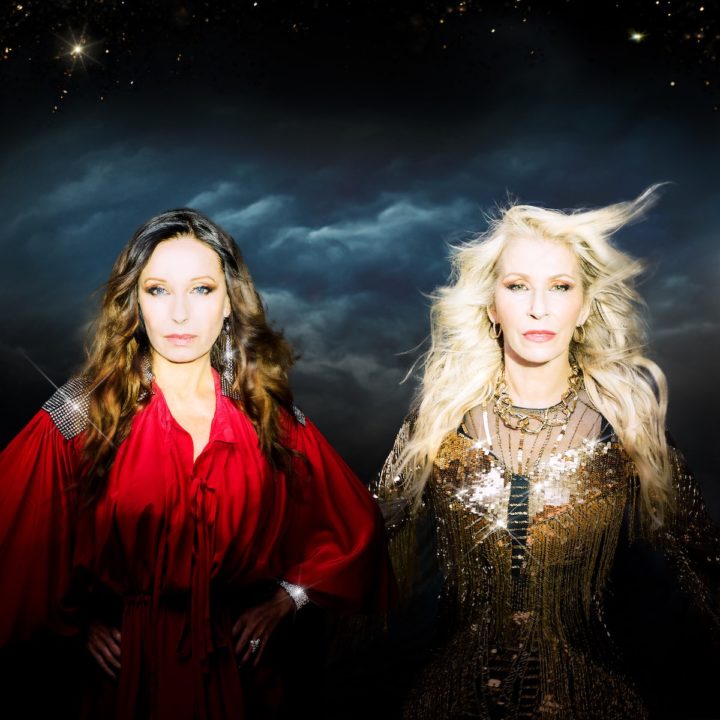
Image © Mark Mattock
As Bananarama prepare for the release of Glorious – The Ultimate Collection, Keren Woodward and Sara Dallin reflects with Classic Pop on how they have overcome everything the industry could throw at them…
“Oh, come on, have a lager!” As Bananarama order some post-lunch coffees at a busy deli in Kings Cross, Keren Woodward invites Classic Pop to fully join in their mischief.
We’re halfway through an interview where Keren and Sara Dallin have been going deep on how they’ve shone for 40 years in a music industry that’s thrown endless obstacles in their path as pioneering women in pop. It’s only in recent years that Keren and Sara have realised just how influential Bananarama were in surviving and thriving, while offering up classics in a hugely diverse yet always poptivist array of styles.
Having triumphed since launching their own record label In Synk for 2019’s In Stereo album, plus a new Best Of collection showcasing what Bananarama have stood for these past 40 years, the duo are as close to relaxing as pop warriors ever get. And yet… it’s a giddy enough experience to spend 90 minutes in Bananarama’s company, without the need for any daytime refreshment. Just a water, please.
Realising that we mean business, Sara and Keren return to analysing exactly what it is that Bananarama have represented since they released debut LP Deep Sea Skiving in 1983 with Siobhan Fahey. “Determination. Freedom,” considers Dallin of the essence of Bananarama. “We’ve always been ourselves, always natural. But then, we’re incapable of not being ourselves. We had to be natural.” Woodward adds: “Bananarama started out just as something that we loved: music. We learned how to write songs, and I loved that. Since then, we’ve toured the world and experienced different cultures. That’s fed into what we do, we’ve been lucky to experience that.”
Sara is right that Bananarama are always absolutely Bananarama. Whether choosing to go ultra-pop with Stock, Aitken Waterman, experimenting with The Verve producer Youth or rediscovering their love of pop with Swedish machine-tooled hitmakers Murlyn, Bananarama nearly always know what they should do next. But it’s only ever been on their terms. Don’t try to get Sara or Keren to play the game, there’s no point.
Au Naturel
“We didn’t have the capacity to fit in,” insists Dallin. “It’s not natural for us to suddenly switch it on.” Woodward admits: “We struggled to be sincere. In the early days, every time we’d do an ident, we’d be (adopts wooden monotone): ‘Er, hello…’” Keren throws a look to her bandmate who, as happens a lot over lunch with Bananarama, is trying hard to keep her composure. “She’s the worst. Sara would sound really wooden, then go to the other extreme: ‘Hi!!! SARA HERE!!!’ We’ve learned to ignore what we’re supposed to say, and just say something in the way we’d get the message across.”
A common theme in past Bananarama interviews is their joint mortification at how awkward they looked in their early Top Of The Pops appearances. They didn’t know which camera to perform to.
In their view, chaos ensued. But didn’t that make them look more natural to viewers? “You’re right, absolutely,” nods Woodward. “We didn’t know what we were doing, and also we weren’t styled. We didn’t have any expensive clothes, so you really could be like us. It was maybe the last time when you could totally find your own way. Now, of course, there are literally places like the Brit School where you can learn to be a pop star. It’s more slick and glossy.”
Fortunate Timing
Whether that’s a good thing for a duo who’ve remained relatable for 40 years, without needing to try, is debatable. Having decamped from their native Bristol to London’s welcoming squat culture at the end of the 1970s, where they met Siobhan Fahey, Bananarama believe they were fortunate to form when they did.
“You could still be working-class and thrive in London, and that’s not the case now,” ponders Dallin. “We had tenacity, but so did a lot of other artists from our era, because none of them came from privileged backgrounds. Being in London at that time, it really was a movement.”
Keren says half of their friends, including Siobhan, were Londoners, while half were from outside of the capital. “So much about Bananarama was from our working-class backgrounds,” she reasons. “We were singing about our experiences. Anyone could be a pop star at that time. Everyone else seemed like us, too: Boy George, Soft Cell, whoever, it didn’t matter where you were from or who you were.” Sara concludes: “Our music was about finding something other than what was expected of us.”
That attitude of “Here we are, have it”, there from the start of Bananarama’s music, was brought home when Dallin revisited her early lyric books as the duo assembled Glorious, their new 40-track compilation. The pair emphasise that they help each other out in all aspects of songwriting, but to generalise it’s usually Sara writing lyrics, with Keren as the studio and musical arranger. “Those old lyrics are a huge part of my life,” beams Dallin. “Going back over them, I can absolutely see how I’m feeling. I can see when I’m going clubbing, what boyfriend I have, when I’m feeling sexy. It’s a big part of my story.”
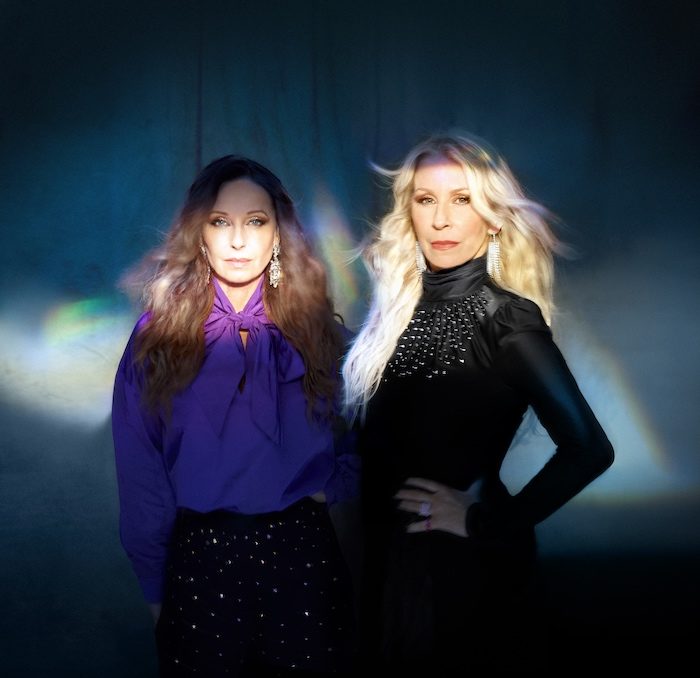
Image © Mark Mattock
Artistic Vision
Despite their early songwriting prowess, it was sadly inevitable that their role in creating those first gems like Cruel Summer and Shy Boy were dismissed by critics and the industry in general. “It wasn’t until Bananarama started that I realised men get more credit,” frowns Woodward. “Growing up, I never saw any differential between what men and women could do. I thought we could all do everything. Then I’d see how men in bands were treated and I’d think: ‘No, hang on, we’re doing that, too.’ We tried railing against it, knowing it was unfair.” Sara: “The trouble is, once you start railing against things, it can make you bitter and angry.” Keren: “But it was unfair.” Sara: “It was, and you have to go through those battles. But then you come out the other side, laughing at those people who dismissed you, because they haven’t destroyed you. The cliché is, it makes you stronger. And it actually does.”
Although Bananarama were patronised by many at the start, thankfully at least their producers were encouraging. Steve Jolley and Tony Swain, the duo who also produced Spandau Ballet and Imagination, were sensible enough to realise Bananarama should sing like Bananarama, as Dallin explains: “They didn’t want our songs to be thirtysomething men dictating what young women would say. The songs were very much our lyrics and ideas.” Woodward continues: “It wasn’t just lyrics. They involved us in arrangements, so we learned a lot from them about how songs were put together. Once we had hits, we became more confident about what we were doing.”
Ready To Pop
On getting stuck with the more socially aware third album True Confessions in 1986, Bananarama enlisted Stock, Aitken Waterman to produce two songs. How encouraging were they for songwriting input? “We had a track record already,” Sara points out. “We co-wrote with them, which I don’t think they let anyone else do.”
True Confessions manages to encompass both the cautionary anti-drug paean Hooked On Love and, well, Venus. “We went into working with Stock, Aitken and Waterman just wanting to make a really good pop record,” emphasises Keren. “It was something different for us, going from quite cool, edgy pop to pure pop – and we loved it.” There’s another burst of laughter as she adds: “We maybe went too far on the next one.”
A year after True Confessions, Wow! featured megahits I Heard A Rumour and Love In The First Degree, but Fahey left soon after its release and the trio were also less in control creatively. “There was more encouragement at first writing with Stock, Aitken and Waterman than later on,” acknowledges Woodward. “What we did with them early on, they were then almost doing that as a template.
“But that’s not to criticise them. I bloody adore Pete Waterman, who’s the biggest music enthusiast you’ll ever meet. Any cynicism didn’t come from him. Matt and Mike were more musically talented, but they didn’t have Pete’s direction. It’s why they were such a good team.”
“I love Wow! and they were brilliant songwriters,” emphasises Dallin. “You can’t really argue with their record. We’ve always loved to try different music, and it’s always essentially Bananarama.”
The 40 songs on Glorious – 10 from each decade – back up Sara’s claims of consistency. In 1991, Pop Life, Bananarama’s sole album with Jacquie O’Sullivan, samples The Stone Roses and features The Gipsy Kings. It’s probably as far as they’ve strayed from pop, despite its title.
“I really loved funk and soul growing up, but it’s never suited us,” says Woodward of the duo’s determination to keep it pop. “I’m just not a soul singer. We could try to sing those songs, but it’s not going to suit my voice.” Sara reasons: “The idea of ‘pop’ is so broad anyway. Even if it’s not thought of in that way, Wonderwall is a great pop song. A good pop song is a good pop song.”
Movin’ On
Since Jacquie left in 1991 after Pop Life, it’s been Woodward and Dallin all the way, bar 2017’s one-off reunion tour with Siobhan. If Bananarama as two lifelong best mates now seems entirely natural, the public were initially reluctant. “We’d had 10 years at the top,” shrugs Woodward. “The next generation came along and The Spice Girls were more their group. It wasn’t so much that we lost our way, but that music changed around us.”
It’s the only time Bananarama considered quitting, but it wasn’t a serious consideration. Dallin recalls: “You can only do what you want to do, and it’s a proper realisation that you have to do what you want, not what you think anyone else might want. It was about finding our own way in that changed scene, wondering if you still want to make music.”
By the mid-90s, Sara and Keren had already been made virtually bulletproof by having to endure so much testing idiocy from the industry. “First we faced the gender barrier and then we faced the age barrier,” sighs Dallin. “People were ageist towards us from our mid-twenties. When you’re 26 and people ask you: ‘Surely you’re not still going to be doing this when you’re 30?’, you just think: ‘Sorry, what?’ Then, when we had children, the attitude was: ‘You’re making pop music and you’re 30-year-old mothers! Hahaha!’”
Although Keren and Sara are as enthusiastic and thoughtful lunch companions as any pop lover could wish for, the look of exasperated contempt that crosses Sara Dallin’s face when remembering how Bananarama were sometimes treated as mothers in music is one that could kneecap a major label CEO. Brilliant popstars, yes. But also: don’t mess.
For all their determination, Woodward is aware of its challenges, as she reflects: “When I had my son, it wasn’t a very comfortable time. One thing had to give, and sadly it was my home life, because I was so desperate to have a career. It’s only when you get the chance to look back you realise how desperate a time it all was.” Our interview is the day before the wedding of Keren’s son, Thomas, whose mother smiles broadly as she considers where her life is now. “I have the best relationship with my son, and at least I kept a roof over our heads.”
Drama Queens
Commercially, Bananarama’s lowest point was 2001’s Exotica, an album only released in France. If you think that means it’s a stinker, check the mighty If on the new compilation, which would rival Venus for sales if it had been released in 1985. “The funny thing is, it’s around that time that we became better as songwriters and as live artists,” smiles Woodward. “We were better than we’d been in the 80s, which we went through with less confidence, not quite knowing what our talents were. I suddenly thought: ‘Right, I know what I’m doing now.’ But no-one wanted to know.”
Read More: Top 20 girl groups
They didn’t expect much better from 2005’s Drama. But the era of Girls Aloud and Sugababes recognised where imperious female pop music had started, with Move In My Direction becoming Bananarama’s first Top 20 hit since Preacher Man in 1991.
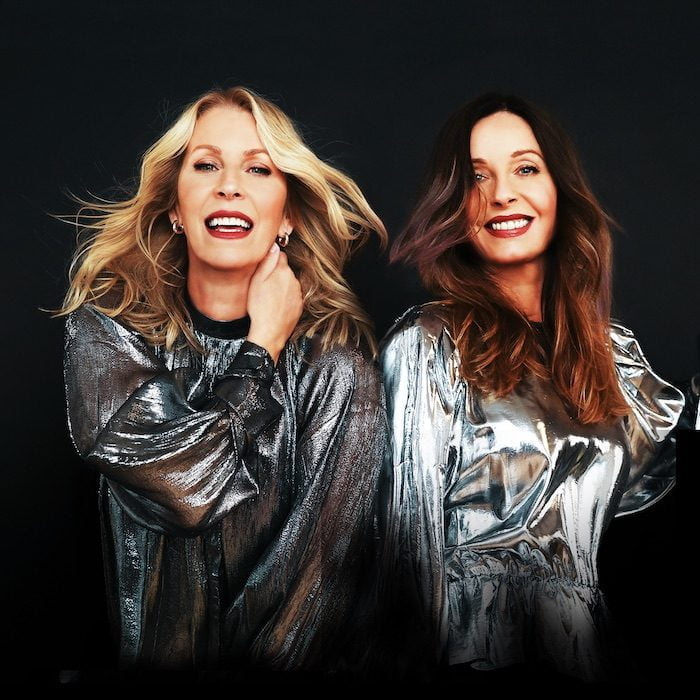
Image © Jack Alexander
Italian record label boss and Bananarama megafan Alfonso Gugliucci teamed Keren and Sara with Swedish producers Murlyn for Drama. “That was the start of us realising: ‘Yeah, we did do all that!’,” smiles Woodward. “Having someone who was so excited to be making a record with us made us feel rejuvenated.” Dallin: “We were wondering: ‘Where do we go now?’, and suddenly we were having an easy, fun time, writing songs in a hotel in Stockholm. It felt like we went from treading water to surfing a wave… I might put that in a song.”
The Drama tour also marked the start of Bananarama working with their live band. One reason for 2017’s reunion with Fahey is that the original trio never had the chance to play live, an experience that first happened touring Wow! with Jacquie in 1988, shortly after Siobhan had left.
“That world tour for Wow! was terrifying, frankly,” says Sara. “We were thinking: ‘God, I’ve never
done this before, what the hell am I doing?’ and it was straight into huge shows. Whereas now, playing live is such a laugh. Getting our own band made the difference.”
They have particularly fond memories of touring the US in 2012, playing intimate venues in association with the Hard Rock chain for breast cancer charity Pinktober: “Just us and the band, where we became a proper rock & roll experience,” according to Keren, as Dallin says: “The Las Vegas crowd were particularly enthusiastic. The next morning, we were walking around the Hard Rock Hotel, looking at the old dears on the fruit machines, fags on the go. One of whom was me, obviously. It’s so funny how you can be completely anonymous when you’re not on stage.”
Mixes & Melodies
The deluxe edition of Glorious: The Ultimate Collection adds a disc of remixes. Sara picks Luke Million’s overhaul of Velvet Lies as her favourite, reasoning: “I like it when remixes keep a sentiment of the melody.” By contrast, Woodward says: “I love it when remixers reimagine the song. I’ve been in clubs before and thought: ‘That’s a great track,’ then realised a minute later: ‘Hang on, that’s one of our songs!’ There’s a genius to giving it their own treatment.”
One of the standout remixes is a slick funk workout of Tripping On Your Love from Pop Life by George Michael. “George didn’t do that as a friend thing,” insists Dallin. “He would never have done it if he hadn’t loved the song.” Keren reveals: “When we played the original to George, he said: ‘I really love that. Can I remix it?’ That’s a big endorsement.”
It was the only time the friends collaborated. “The idea of working together never really came up, because it was just a normal friendship,” explains Woodward. “We weren’t sat there saying: ‘Hey, let’s do a song together.’ We mostly played silly party games with George.” Sara: “George was mostly angry with us, as we beat him at every game we played. George would be fuming: ‘It’s not fair playing you two, you know what each other is thinking.’
“Our friendship was basically that and us laughing at George because he’d got his wellies stuck in the mud.”
Despite their closeness, George had one firm rule: he wouldn’t let Keren and Sara meet Elton John. Dallin laughs: “George liked us because we’re honest. And we were maybe too honest with him, because he’d say: ‘I can’t take you to meet Elton, you’ll just embarrass me.’ We’d never have shown George up in front of Elton, of course.” Have they ever met Elton? “No!” says an aghast Woodward. “But his husband David is lovely, he always comes to our shows.”
Read More: Bananarama albums – the complete guide
Also in the Glorious deluxe edition is a photo book featuring some of the items from Bananarama’s looks over the years, from square-toed Vivienne Westwood boots to Jean-Paul Gaultier fishnet bodices. “We work closely with all our designers on our sleeves,” says Sara. “We don’t want to put anything out that we don’t approve of.”
If the original trio were skint when they started, fashion has always been important to them. “We wanted to look glamorous in a way that we could afford, which meant going to places like Kensington Market,” recalls Keren. “Glamour meant different ideas to everyone when Bananarama started. You could look how you wanted, so everyone had their own look.”
“There never was a defining Bananarama look,” considers Dallin. “We were punky and really creative with our clothes. That’s why we stood out, but all the bands stood out in their own way because they were creative, too, whether it was Duran or Culture Club. People sometimes try to dress as Bananarama at 80s parties, but they just throw on headbands, legwarmers and ra-ra skirts. I doubt we ever wore those.” Sara raises her eyes in frustration. “Horrendous.”
A Different Take
Because of its 10 songs per decade remit, what Glorious doesn’t include is some of Bananarama’s hits, such as Shy Boy or Na Na Hey Hey Kiss Him Goodbye. Woodward’s eyes roll straight out of her head and off the deli table when this is raised, as Dallin points out: “We’d have needed 60 songs to fit everything on.” Recovering her composure, Keren reasons: “Do people only want Greatest Hits compilations? Fans will already own those songs, and another hits compilation would be the same thing they’ve always had. Let’s do something different and show our whole career, the songs the two of us think represent Bananarama best.”
In discussing their whole career, it’s nice to report that Keren and Sara have met up with Siobhan since the reunion tour, at the 2021 launch of stylist David Thomas’ book, Vanity Project. “We won’t see each other for a long period, but when we do, we fall straight back into it,” smiles Dallin. “Siobhan has the same humour as us and I love her company. She lives in L.A. and we have very different lives, but we fall about laughing when we see each other.”
They haven’t seen Jacquie “in a long time,” but Woodward stresses: “That’s just our lives moving along and doing different things. Like with Siobhan, Jacquie is someone who we could go years not seeing but we pick it up straight away when we do.”
For the whole of those 40 years, Bananarama has been those two teenage best mates from Bristol. The world has finally caught up with Sara Dallin and Keren Woodward, and realises respect is due. “We rode the wave in the 80s, slightly not in control,” reflects Sara. “Since we released In Stereo on our own label four years ago, we’ve shown we can do this on our own. We’re so proud of that, and Masquerade is my favourite album we’ve ever done, though Drama runs it close. We do things in our own time in our own way. It’s purely for us, not the industry. After everything we’ve been through, that’s big.”
Bananarama’s taxi is waiting, as Keren has wedding duties to oversee. Her final words summarise that Bananarama are where they should have always been: “Where I am now makes up for all the years when it was hard. We do what we want to do, when we want to do it. We make the decisions ourselves, and they seem to be working. Bananarama now? I think to myself: ‘Hello, we’re doing alright here!’”
Glorious: The Ultimate Collection is released on 8 March 2024 via In Synk. Bananarama play London Palladium on 3-4 April. They will also headline the 80s Classical event at Millennium Square, Leeds, on 20 July. For tickets click here
Read More: Top 20 girlband singles of the 80s
Classic Pop may earn commission from the links on this page, but we only feature products we think you will enjoy.

